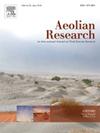An evaluation of different approaches for estimating shear velocity in aeolian research studies
IF 3.4
3区 地球科学
Q2 GEOGRAPHY, PHYSICAL
引用次数: 0
Abstract
Sonic anemometry represents an important technological advance for aeolian studies, fostering better understanding of near-surface turbulence and improved methods for estimating shear velocity (). Here, we compare estimated from the Law of the Wall approach and from four methods that use 3-D wind vector measurements from sonic anemometers: double rotation, triple rotation, planar fit, and a newly developed approach based on invariants of the Reynolds stress tensor. Data were collected over 7.5 months at the Jornada Experimental Range in the Chihuahuan Desert, southern New Mexico, USA. We used estimates from the double rotation method as a reference for comparing the other methods because of its prevalence in the aeolian literature. On average, estimates from the other three methods are within 5.0 % of estimates from the double rotation approach. Estimates from the triple rotation approach were 2.2 % lower on average. Estimates from the planar fit method were the most similar, within 1.3 % on average. Estimates from the stress tensor approach were 4.9 % larger on average. We found significant discrepancies, ranging from −14.7 % to 13.7 %, among estimated from the Law of the Wall and the other methods. This underscores the need for careful methodology selection to ensure accurate characterization of boundary layer turbulence.
评估风化研究中估算剪切速度的不同方法
声波风速测量是风化研究的一项重要技术进步,有助于更好地了解近地表湍流和改进剪切速度(u∗)的估算方法。在这里,我们比较了根据壁面定律方法和利用声波风速计三维风矢量测量的四种方法估算的 u∗:双旋转、三旋转、平面拟合和基于雷诺应力张量不变式的新开发方法。我们在美国新墨西哥州南部奇瓦瓦沙漠的乔纳达实验场收集了 7.5 个月的数据。我们使用双旋转法估算的 u∗ 作为比较其他方法的参考,因为该方法在风化文献中非常普遍。平均而言,其他三种方法得出的 u∗ 估计值与双旋转法得出的估计值相差 5.0%。三重旋转法的估计值平均低 2.2%。平面拟合方法的估计值最为接近,平均在 1.3 %以内。应力张量法的估计值平均高出 4.9%。我们发现,用墙体定律和其他方法估算的 u∗ 存在很大差异,从-14.7%到13.7%不等。这强调了需要谨慎选择方法,以确保边界层湍流的准确特征。
本文章由计算机程序翻译,如有差异,请以英文原文为准。
求助全文
约1分钟内获得全文
求助全文
来源期刊

Aeolian Research
GEOGRAPHY, PHYSICAL-
CiteScore
7.10
自引率
6.10%
发文量
43
审稿时长
>12 weeks
期刊介绍:
The scope of Aeolian Research includes the following topics:
• Fundamental Aeolian processes, including sand and dust entrainment, transport and deposition of sediment
• Modeling and field studies of Aeolian processes
• Instrumentation/measurement in the field and lab
• Practical applications including environmental impacts and erosion control
• Aeolian landforms, geomorphology and paleoenvironments
• Dust-atmosphere/cloud interactions.
 求助内容:
求助内容: 应助结果提醒方式:
应助结果提醒方式:


